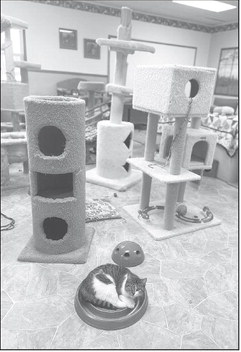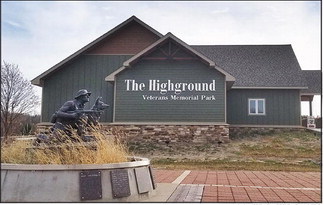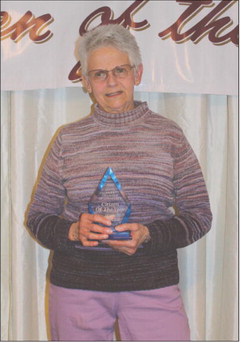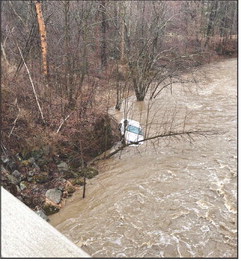Clark County Humane Society experiences challenges


As inflation and economic challenges have put a strain on many businesses, nonprofits operating under a limited budget have also felt the crunch as they endeavor to continue to provide important services to their community. The Clark County Humane Society (CCHS) is no different, as an influx of animals combined with fewer adoptions and increased supply costs have made it more difficult to sustain operations at the current level.
Founded in 1987, CCHS is proud to be a no-kill shelter that cares for dogs and cats until they can be placed with their “forever families.” In the past few months, the humane society has seen an uptick in the number of animals in need of assistance, whether they be strays, returns, or surrenders. This is in keeping with what seems to be a national trend, largely thought to be due to increased financial strain on many people.
“In other years, strays were returned to their homes; in 2024, an overwhelming number of strays remained at the shelter and were adopted out to new families,” April Dickson of the humane society wrote in an email.
Stray animals are held for the minimum number of days as required by law, so that a family looking for a lost pet has the chance to reclaim it. However, very few are returned to their homes.
“There are lots of theories about animals being ‘dumped,’ but we continue our belief that people have to better than that. We do know that caring for your animals
Please see Humane society, page 6 Humane society,
from p. 1
is more expensive than ever,” Cheri Wegner wrote in the humane society’s fall newsletter.
“We’ve never seen the price of pet food so high. Heaven forbid your pet should need a specialized diet such as for kidney care, a liver condition, etc.,” she added.
She gave the example of a 17-pound bag of Royal Canine Urinary Care food that she recently purchased for a cat with urinary crystals. The cost was $119.99.
“We never thought we’d see the day, and other groceries are just as expensive. So if you have a limited budget and you have to choose between feeding your family and your pets, we understand the difficult decisions that some people face and we respect their choices,” she wrote.
Dogs and cats may also end up being returned if a family adopts a pet and realizes they are not able to take on the financial or other responsibilities associated with caring for a pet. There is an application process to adopt and the shelter does its very best to place animals with compatible owners, but occasionally it does not work out.
A surrender occurs when someone gives their pet to the shelter to be adopted.
“Very common reasons (for surrenders) recently are that they cannot afford the dog or cat anymore, they are moving and can’t find a place that will allow them to have the dog or cat, or the owner passes away and they do not have someone to take care of the pet,” wrote Dickson.
CCHS may not be able to accept the surrendered pet right away until another pet is adopted and a space opens up. The waiting list for surrenders has been getting longer and longer.
CCHS has a capacity of 70 dogs and 44 cats, and the census can fluctuate quickly. Less than a month ago, the shelter had close to 30 cats; this week it has 11. When there was a higher number of cats, there was a lower number of dogs, around 3035. However, this past weekend the shelter took in 24 dogs, so its dog population is high again.
“Currently, we are around 50 dogs. That can change quickly, and strays have a big effect on the census, because we have no control over the situation. This past weekend we had four stray dogs come in. That can be difficult, because if we agree to a certain number of surrenders, it can be hard to coordinate the kennels for the unexpected dogs. We always do, but that also adds to why someone may have to wait a bit to bring a surrender in, because we have had strays come in and need a space for those as well,” wrote Dickson.
In addition to experiencing higher numbers of pets, the shelter has also recently had to deal with several special medical cases coming to the shelter as strays and surrenders.
“We know that veterinary care is expensive, and if your pet should need a special surgery or need to be referred to a specialist, it can easily break the bank. We are in no way being critical of other practices and what they charge. We know that they have staff and overhead to support. We just know that we are extremely fortunate to have veterinarians on staff that can handle these special cases for our shelter animals. But we also know that the expense of all veterinary care is making it harder and harder to afford to keep pets. And that can lead to more difficult decisions,” wrote Wegner.
Challenges such as higher census numbers, higher medical costs and more pets being surrendered are occurring at shelters across the country. Shelters in southern states are being inundated with more homeless pets than ever before.
“While we used to make a concerted effort to help with dogs being transported from down South, we have now found it a better choice to focus on the animals in need in our own communities,” wrote Wegner. “Breeders and puppy mills have increased their production, and then found it difficult to sell their ‘produce.’ As a result, we have had more unwanted litters being rescued and brought to CCHS.”
The shelter worked hard to advocate for puppy mill legislation. Wisconsin Act 90, or the “Puppy Mill Bill,” was signed into law in 2009 and went into effect in 2011. The law was intended to ensure that breeders meet minimum care standards for dogs and prevent Wisconsin from becoming a destination for irresponsible dog breeders. However, many loopholes have been found, reducing the effectiveness of the law.
All of the issues previously described, especially the increased costs for taking care of a pet, have led to fewer adoptions and more animals at the shelter.
“Our costs have only risen with additional animals, and we are so grateful for all our members that support us and keep us going. But every day it gets a little harder. Supplies are costing more, and medical items needed for our Fix-A-Pet program are more expensive too. The challenges are increasing!” wrote Wegner.
CCHS is looking at a couple of solutions to help address these challenges.
“Depending on how things go, if numbers keep increasing, we may have to rethink the number of animals we can have at the shelter at a time to ensure there is always room for the strays that come in. We additionally may have to look into using a foster care system to ensure there is room for the strays,” wrote Dickson.
Ways you can help There are several ways to support the shelter so it can continue its mission of assisting lost, surrendered, unwanted or unloved cats and dogs.
“Honestly, we can always use help with volunteers. From caring for the animals to laundry, any and all help is appreciated. In-kind donations and monetary donations are extremely important as well. These help us to be able to continue our care of the animals,” wrote Dickson.
Volunteers are needed, whether a person is able to help several times a week or even just once a month. The shelter could especially use volunteers on Mondays and Fridays from 9-11 a.m., to walk the dogs and help with laundry.
“This makes such a huge impact on the dogs, and is needed not just in the summer months but the winter months as well,” said Dickson.
CCHS can also use office/secretary help with answering phones and processing adoption paperwork on Wednesdays and Saturdays from 11 a.m.-4 p.m. Volunteers are also needed to help with the daily care of the animals; this occurs in the morning and evenings. If any of these opportunities interest you, contact Dickson at cchsoutreach1@gmail.com or go to cchspetshelter. org/volunteer and fill out the form.
The shelter’s wish list includes the following items: monetary donations, distilled water, 33-gallon trash bags, stamps, bleach, PineSol, paper towels, toilet paper, canned cat food (paté), dish soap, bags of aluminum cans, laundry detergent, dog toys, liquid Tide (with bleach), cat litter (clumping), and Purina Cat, Kitten, Dog or Puppy Chow. CCHS also has wish lists online on Amazon, Chewy, Walmart, Lupine, Max& Neo, MyRegistry.com and a Paypal Giving Fund.
The shelter is at W3926 State Highway 73, Neillsville, and is open from noon to 3 p.m. on Monday, Wednesday, Friday and Saturday. Adoptions are done by appointment only. People may also call 715-7434550 for more information.
Editor Valorie Brecht contributed to this report.
CONTRIBUTED PHOTO





